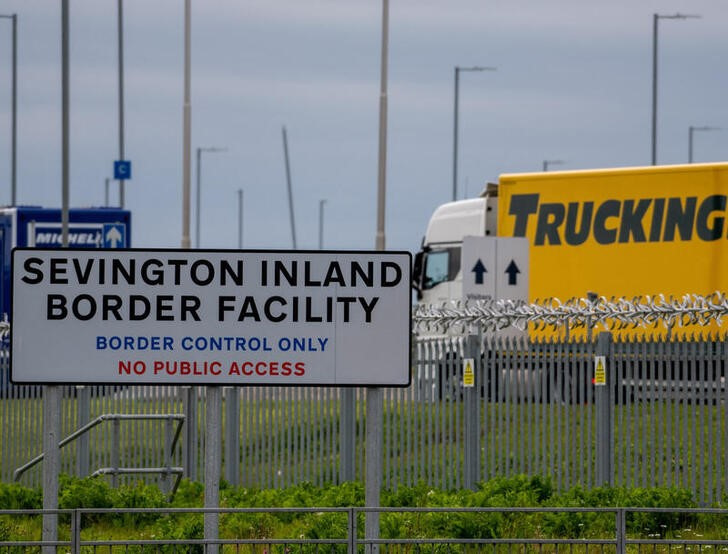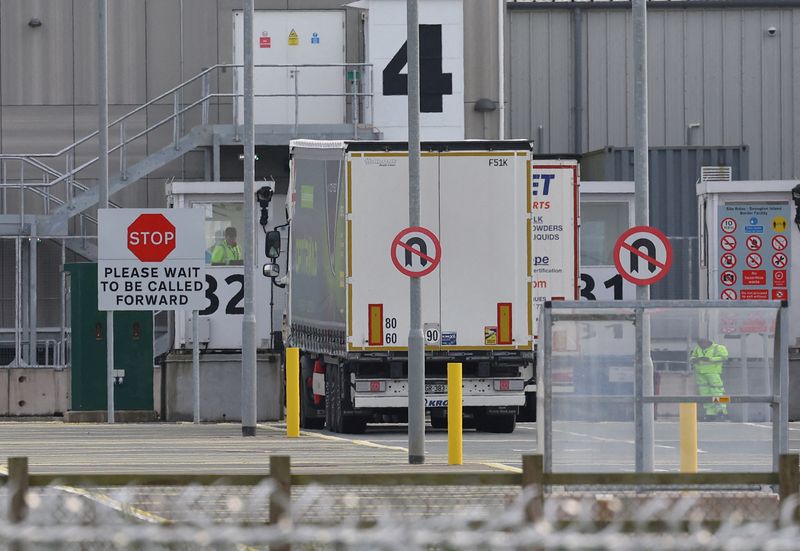By James Davey
LONDON (Reuters) -Britain launched physical checks on fresh food products imported from the European Union on Tuesday some three years after it left the bloc's single market and eight years after it voted to leave the EU.
While Britain's major supermarkets and large EU exporting businesses have greater resources to handle the paperwork and new demands, smaller retailers and wholesalers have warned of delays and disruption and said consumers should expect a reduced variety of quality goods, less fresh produce and higher prices.
The first phase of Britain's so called new Border Target (NYSE:TGT) Operating Model, requiring additional certification, came into force on Jan. 31.
A second phase kicked off on Tuesday introducing physical checks at ports for so called "medium risk" animal products, plants and plant products, such as meat, fish, cheese, eggs, dairy products and certain cut flowers. New charges have also been introduced.
The government says the new checks, which involve visual inspections and temperature readings of goods, are essential to help prevent diseases and pests entering Britain and will level the playing field for UK exporters.
"It is essential that we introduce these global, risk-based checks to improve the UK's biosecurity," Cabinet Office minister Lucy Neville-Rolfe said.
"We cannot continue with temporary measures which leave the UK open to threats from diseases and could do considerable damage to our livelihoods, our economy and our farming industry."
Britain had repeatedly delayed imposing checks on EU imports. By contrast, the EU immediately enforced its rules, leading to port delays in 2021 and prompting some British exporters, such as cheese-makers and high-end beef farmers, to give up on selling to the bloc, at least initially.
Last week UK lawmakers called for clarity from the government on the frequency of checks, saying businesses remained in the dark.
"Firms face mounting confusion and uncertainty about exactly how and when the borders checks and costs will be fully implemented," said William Bain, head of trade policy at the British Chambers of Commerce.
Nigel Jenney, CEO of the Fresh Produce Consortium, said the government had "single-handedly created the world’s most inefficient and expensive border."
He said industry had been informed that inspection staff would not be available at border control points beyond 7 p.m. - a major oversight given that "95% of all the goods in our sector arrive beyond the hours that UK government officials wish to work."
A Cabinet Office spokesperson said each border control post will have its own operating hours based on trade levels and demand. These will vary by site and region across England, Scotland and Wales, and many sites may extend operating hours outside of business hours.
The government has said it will take a "pragmatic approach" to checks, prioritising the goods posing the greatest biosecurity risk and maintaining the smooth flow of imported goods.

It estimates its border rules will increase costs for importers collectively by 330 million pounds ($413 million) a year, and increase food inflation by just 0.2% over three years.
($1 = 0.7983 pound)
